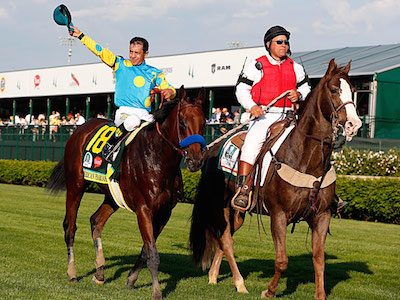
Horse owners or the general partner of thoroughbred partnerships face an important decision before every start. Who do you choose to ride your horse?
Jockeys Have No Contracts
Jockeys, like Triple Crown winner Victor Espinoza above, are hired on a race-by-race basis. To select a jockey you must first speak with their agent. Yes, every single one of them has an agent! The jockey agent has one very simple, yet often times extremely difficult, job… book his rider on the best horse in each race. Jockey’s main pay comes from winning a race as their compensation is based on a sliding scale. They receive 10% of the winning purse, but only 5% of the 2nd or 3rd place purse OR even worse $150 flat for finishng 4th – last. Bottom line, clearly Jockeys want to ride the best horse in each race.
As a horse owner, or general partner of a thoroughbred partnership, it goes without saying that your relationship with your trainer and the jockey agents are critical to your success. Most have a “go to” jockey. Unfortunately, unless your stable has top-caliber thoroughbred horses performing well in allowance/stakes races, there is a good chance you are going to need a second, third or even fourth jockey for your horses. Knowing all the jockey styles and work ethics will help you pivot when your ”go to” isn’t available. Truth be told, the top jockeys usually ride for the top trainers. So, if your horse is not trained by one of the big boys, like Triple Crown winner Bob Baffert, you are going to have trouble getting a commitment to ride from one of the top jockeys.
To secure the best mounts jockeys often come out in the mornings and ride your horse during a workout. The jockey agent is also an omnipresent observer to all morning activities. The agent should know every horse on the circuit and be ready to place their client on the best horses in each race. The agent receives a healthy percentage of the earned jockey fees and he earns it.
Giving “The Call”
Here’s how it works. Every couple of weeks, the host track will distribute a condition book. The condition book features a listing of all of the races which will be offered during usually a two or three week period. The condition book is the bible for owners, trainers, and especially jockeys agents.
Once the condition book is released, the jockey agents start calling, and texting the trainers and owners. If the agent finds a horse he likes, he is given “the call” – ie the jockey is “booked” for that horse on that day. I used “quotes” because this is an non-contractual “booking”. If a better horse later becomes available, the trainer or general manager of a thoroughbred partnership may get a call saying the jockey is choosing a different horse. This is called “being spun”. Owners and trainers do not like this. If a jockey spins them, not only do they lose their presumably first choice, many times it is too late to get the second, third or fourth choice.
So…Which Jockey?
As managing partner of a thoroughbred partnership, we want riders who trust us and are willing to ride hard for us. Needless to say, these kinds of jockeys may not always be at the very top of the jockey standings and, that’s fine by us. In other cases, a big stake race for example, we suggest leaning to a jockey who has experience in big races… if you can get ‘em! Jockeys make countless, split second decisions during every race and you want clutch, experienced jockeys who remain calm when the stakes are raised making these quick decisions in big races.
Always have a back up plan.
Trainers and the managing partner of a thoroughbred partnership should always be thinking of more than one jockey when the condition book comes out. Thus, if your top jockey choices another horse you are able to instantly pivot to another jockey. In most cases, jockeys don’t “spin”. The more likely scenario is the agent will simply say “we can’t commit for a day or two”. At this point you can either wait for your #1 choice or choose someone else. Often times you pivot right away for fear that the top jockey says no and your backups have already solidified mounts for the race.
We hope you’ve learned a little about the selection of jockeys. Trainers and managing parters of thoroughbred partnerships face these decisions daily. The right plan and management (as well as being with the right trainer or thoroughbred partnership) can result in consistently getting better jockeys on your horses.
{{cta(‘a45b9e4c-2a9d-4ba4-8fce-a96b9db491b0’)}}
